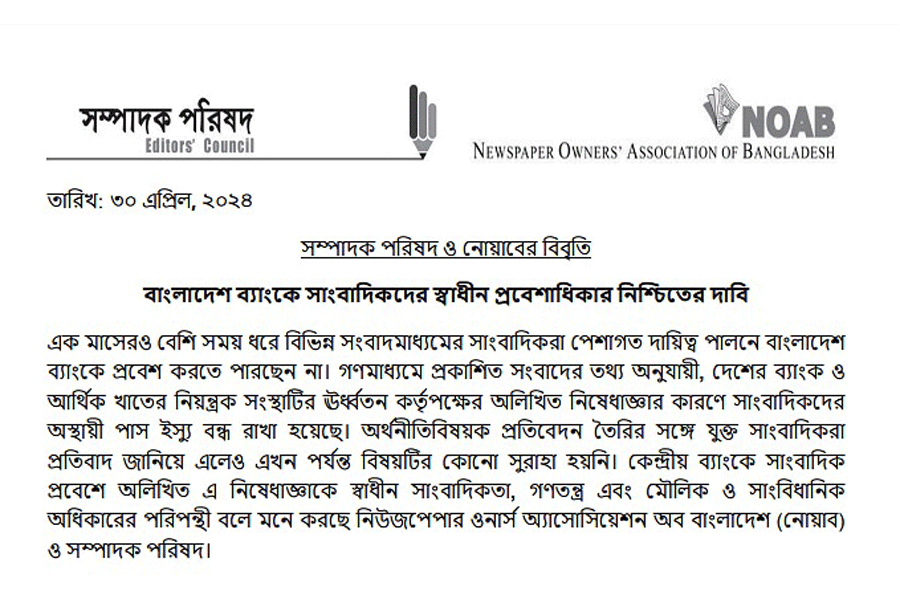NOAB, Editors’ Council condemn BB’s ‘unwritten ban’ on media entry

Published :
Updated :

The Newspaper Owners’ Association of Bangladesh (NOAB) and the Editors’ Council have said that Bangladesh Bank’s ‘unwritten ban’ on journalists' access to its headquarters amounts to taking away media freedom.
NOAB President AK Azad and Editors’ Council President Mahfuz Anam said this in a joint statement on Tuesday. The statement called for swiftly ensuring an uninterrupted access for journalists to the central bank headquarters.
Citing media reports, according to the statement, for more than a month, journalists from various media outlets have been unable to enter the Bangladesh Bank to fulfil their professional duties as the issuance of temporary passes to journalists has been stopped due to an unwritten ban imposed by the top authorities of the country’s banking and financial sector regulatory body. Even though journalists associated with the preparation of economic reports have been protesting this, the issue has not been resolved so far.
Bangladesh Bank Spokesperson Md Mezbaul Haque recently spoke to the media about this issue, and it came to the notice of NOAB and Editors’ Council, the statement said, noting that the BB spokesperson had said, “From now on, journalists can only approach the spokesperson with specific permits (entry passes). If an official gives a pass to a journalist, then the latter can only meet the former. However, journalists will no longer be able to enter any department of the central bank as before.”
The joint statement by NOAB and Editors' Council described the step mentioned in the statement of the Bangladesh Bank spokesperson as just representative of an unannounced ban on journalists’ entry to its headquarters. It also said that as a result of the ban, people will be deprived of their rights to know the actual condition of the banking and financial sector, that is, the country’s economy. On the other hand, it will further increase public distrust of the sector. At the same time, it will further encourage irregularities and corruption in the banking and financial sector.
It added that the central bank is one of the most important institutions for any country’s economy and public trust. It is necessary to ensure an uninterrupted flow of information to build a sustainable banking sector and strengthen public trust in the sector. For the last 53 years since independence, journalists have been playing a vital role in ensuring accountability in the banking and financial sector of the country, along with fulfilling people’s information needs through free access to the central bank and through gathering information.
On April 25, agitated journalists staged a sit-in in front of the Bangladesh Bank to protest the unwritten bank's entry to its headquarters.
The same day, the top leadership of the Economic Reporters’ Forum also had a meeting with the central bank governor, but no solution could be reached.
Four associations of journalists, including Dhaka Reporters’ Unity, issued statements on Friday and Saturday condemning and protesting the central bank's ban on the media bank to its head office.


 For all latest news, follow The Financial Express Google News channel.
For all latest news, follow The Financial Express Google News channel.